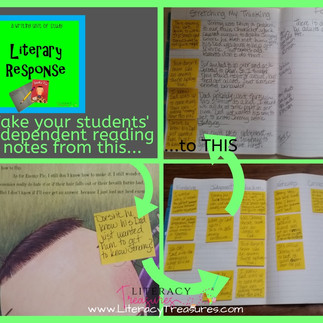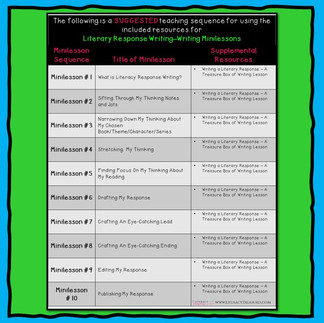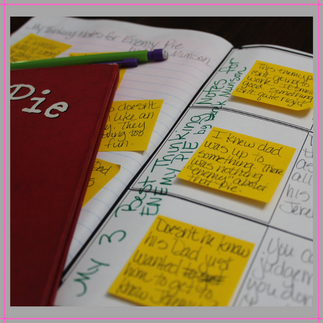
You know I'm all about reflecting on your teaching practices...so here's a reflective question...
What's your endgame as an educator?
Successful test-takers or Thoughtful Readers
Testing Season Stresses Me Out!
Testing season is near and teachers are ready to take on the challenge while not sacrificing personal convictions and philosophies about literacy instruction. BUT...it's hard sometimes. Admins are talking NUMBERS all the time. Your practice scores are not really where you want them to be.
Don't stress over it!
Reflect on what all you've taught and all that your students
have accomplished this school year.
You've taught students to monitor their own comprehension.
You've taught students to follow characters through the plot of a story.
You've taught students to use text features.
You've taught students to make relevant inferences.
You've taught students to draw conclusions based on text evidence.
You've taught students to think about and analyze text.
You've taught students to....
You've taught students to...
You've taught students to... You can fill in the blanks with so much more!
SO...now testing season is the time to teach students how to apply all of those strategies and skills to a NEW GENRE OF TEXT...Standardized Reading Passages.
Reading standardized passages is different than just choosing a piece of text we want to read. Readers need to know HOW to approach this new genre.
But How Do I Teach Testing Genre Without Sacrificing My Literacy Instructional Time
Spend a couple of weeks during the READERS' WORKSHOP to guide readers through this standardized reading genre a few weeks before the test.
There are several key teaching points to make about the genre of standardized reading passages.
Readers get to know the text before reading to get the big picture
Readers annotate the text to create a 'road map' for question answering
Readers preview the text by reviewing the questions to set a purpose
Readers are familiar with the different types of questions that tests are asking
Readers must justify their answers in order to choose the best possible answer to multiple-choice questions
5 Key Teaching Points for a Test Prep Unit of Study
These key teaching points could be objectives for minilessons that lead to independent reading. Students must still have the opportunity to live out their regular routine during the literacy instructional block that includes independent reading.

Readers get to know the text before reading to get the big picture
Readers must know how to determine the "real" reading genre as they preview the reading selection using the Browse, Connect and Question strategy.
Students will notice features they are familiar with different genres of reading. Then they can shift their minds to that type of text.
✔Readers know that fiction has dialogue.
✔Readers know that poetry has rhythm and patterns.
✔Readers know the features that make text nonfiction.


Readers annotate the text to create a 'road map' for question answering
Model how to read through a short text and think on paper to jot little thoughts about the reading.
This will create a 'road map' to search through when answering the questions.
Model using short articles how to read, stop, think and jot. This little

Readers preview the text by reviewing the questions to set a purpose
This has always been a controversial topic with teachers that I have worked with in the past. I've encountered teachers on "both sides of the aisle".
Should students read the questions before the passage? I say YES! And here's why?
If students browse and read the questions before they read the passage they will be better equipped to answer the questions.
Readers will already know the kinds of evidence they will need to collect in order to select the best answer choices. Some teachers have disagreed with me, but it has always been successful with the readers in my classroom.

Readers are familiar with the different types of questions that tests are asking
If we teach students to read the questions before they read a testing passage, then we should definitely teach them the kinds of questions they will encounter on a test!
Even if you choose not to teach key point #3 above, readers still need to know the kinds of questions they will be asked.
All tests have the same kinds of questions, just worded a little differently.
Students need to look at those question stems and determine which of the comprehension strategies or skills they need to apply to each type of question.
Then, when they read the questions before reading the passage they will be even BETTER equipped to locate the evidence they need to provide the best answer choices for each of the questions.


Readers must justify their answers in order to choose the best possible answer to multiple-choice questions
Readers must justify their answers using the 'road map' they annotated along the way as they read the passage.
When students know the types of questions being asked and how to apply their comprehension strategies and skills to each type of question, they can use their road map to find the justification they need to make the best answer choice for each of the questions.
It's as simple as that! I know it's not simple, but it's a challenge that students need to work toward!
You've GOT this!!
But more importantly...
YOUR READERS HAVE GOT THIS!!
Check out this gallery to preview a couple of resources
designed to help you through your test prep unit of study
Until next time...

Just click on the product covers below to find
these resources for test prep in the Literacy Treasures Shop




















